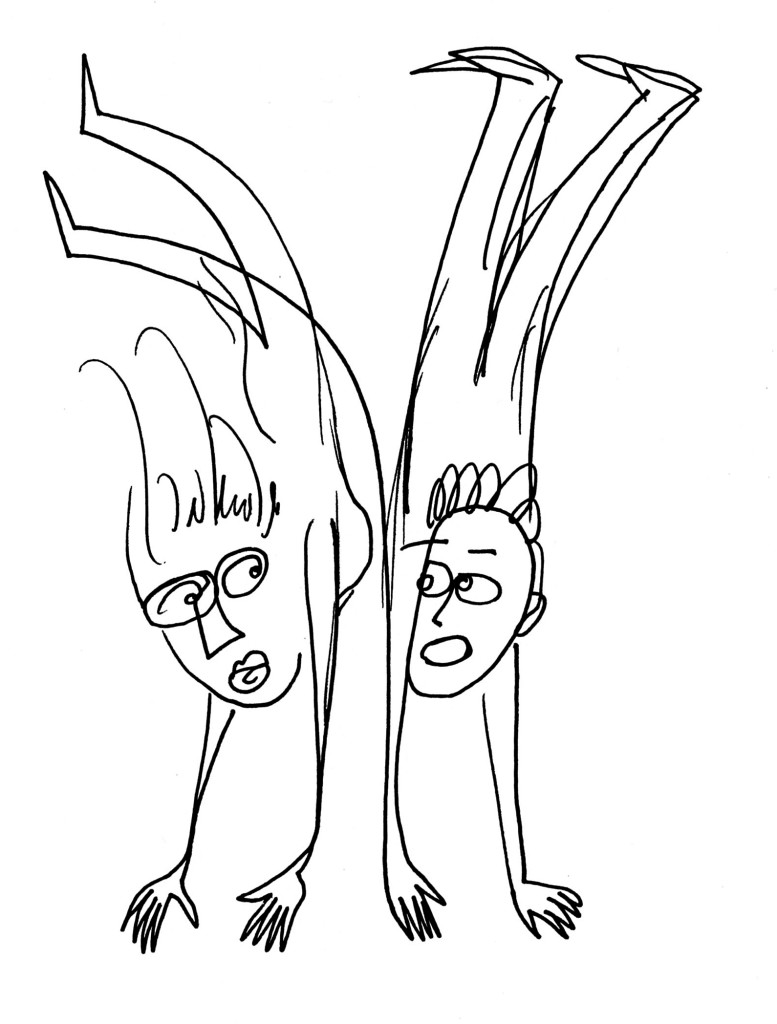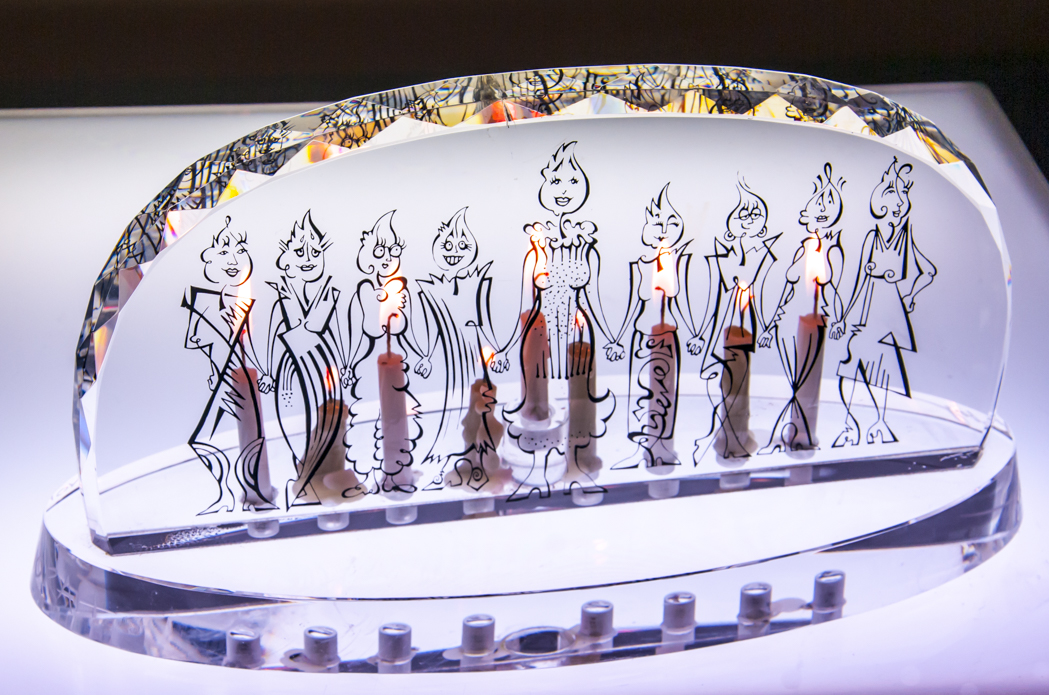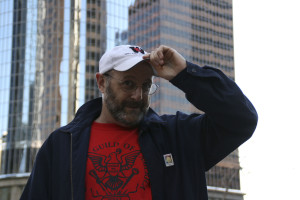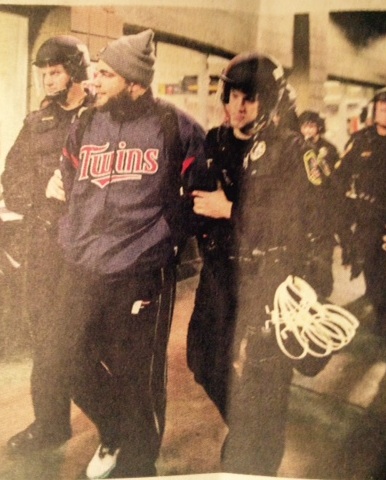The first time I got arrested in Minneapolis I realized two things:
- You enter into what Ken Kesey called, “the cops and robbers game,” in which all old rules go out and you’ve got to play with a whole set of new ones.
- You learn that it can be better to be a woman than a man.
Picture this: 577 anti-nuke protestors scaling the security fence at Honeywell Corporation hard by the Interstate 35 (Hence, Twins jacket in photo). Actor Martin Sheen is with us too — yay!– but when we land on the other side of the high wire, cops are waiting for us. They slap their plasticuffs (see same photo) on us, which they’ve been using instead for the past what, 40 years now, but still burn into your wrists?
This turns out to be the biggest arrest in the history of Minnesota protest. No kidding. (This was in the 80s, so does record still stand?)
The “Honeywell Project,” was a group of activists out to convert the corporation — you may know Honeywell for blenders, home security systems, popcorn poppers. Did you know they also made cluster bombs? And missile parts, too. The idea behind the Project was a peace conversion for Honeywell, to strike their swords into plowshares, with no loss of jobs. Did I mention Martin Sheen was with us, in his funny Minnesota ski cap (similar to guy in photo)? Marty’s tops; he plays the judge in, IN THE KING OF PRUSSIA, a 1983 dramatization about the “Plowshares Eight” who broke into a GE plant to protest nuclear weapons, pouring vials of their own blood onto secret missle plans. *
Man owns four things
that are no good at sea:
rudder, anchor, oars
and the fear of going down.
Antonio Machado * *
When you climb over and fall onto the lathered green of Honeywell Property, cops quickly slap and strap ‘em on you, pack you into vans and off you go because you’ve been arrested for criminal trespass. Heading downtown I will meet women from different “affinity” groups who live as far away as Iowa and Wisconsin. One of them notices my agitation under the stress and straining of these restrictive plasticuffs and she puts her hand on my knee.
“You know,” she says. “Nothing the police can do to us is as bad as nuclear destruction.”
Listening to her actually calms me down a little. (SEE previous blog entry on LISTENING LOUDER) Then a woman from Red Wing tells me she’s been heading to the streets to fight corporate obscenity like this for forty years. She is so serene about everything; hell, it just gets me all pissed off again.
At the Hennepin County Jail now, I’m not only arrested, I’m tired and angry too, and very much dead on my feet because we first gathered this morning at six and now it is late afternoon and still freakin’ cold in Minneapolis.
Men are led into one holding cell. The women are taken to another holding cell.

Here in my cell of men, what kind of conversations do you think you get?
“Cops. I hate cops, don’t you?”
– Yeah I hate the damn cops.
“How you feel about the Vikings?”
– They suck.
“Yeah they suck.”
– You got a cigarette, man?
As comedian Robert Klein would have put it: “Not much happening there!”
But as I’m getting fingerprinted, trying not to be afraid – they press your fingers down really hard and you’re left with tons of black ink that never come off — look at this: I can see right into the women’s cell. And I give a long hard look at the womenfolk in there.

I can see the women in there are holding hands. The women are in some kind of a circle, surrounding one woman who appears to be on her stomach, stretched out in the middle of the circle of women. Right on the floor of the cell. The women around the circle are chanting at her. It could be something Buddhist, who knows. Kurdish even. Then they’re running their hands along the back and sides of the woman on the floor. Completing this ritual, they motion themselves into a togetherness by closing the circle and hugging.
Wow, I’m thinking. I could use all those things right now: Songs of solidarity. Sympathy. A back rub.
Because while I have always had the ability to withhold my own with any man, I can’t help think as I’m being lead back to my cell: I’m in the wrong affinity group here!
In fact I realize that if it weren’t for those women, I would never have made it through that day peaceably. [Note: This is before the men’s movement of the ‘90s, so maybe its all changed now – fellows read Robert Bly translations of Rumi to each other so maybe things changed.]
Ever since Minneapolis, I’ve preferred talking with women. Post-prison, I’ve even loved singing with them, which I highly recommend.
Back Pocket Banter When Talking to the Police
Once I was walking with my friend, the comedian Paul Lyons. Just strolling, we suddenly saw a policeman out in front of a neighbor’s house.
“Did you call for backup?” Mr. Lyons asked the policeman.
Works!
* IN THE KING OF PRUSSIA http://www.imdb.com/title/tt0084130/
Honeywell Project history: http://www.wri-irg.org/en/node/3101
** Antonio Machado https://poetrydispatch.wordpress.com/tag/antonio-machado/
Doesn’t matter which direction you point your prayer rug. Rumi
 That’s it for this time — cheers, Ha!nk
That’s it for this time — cheers, Ha!nk


